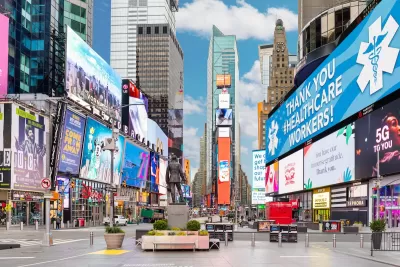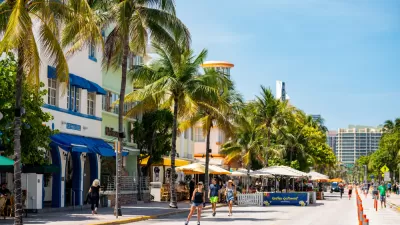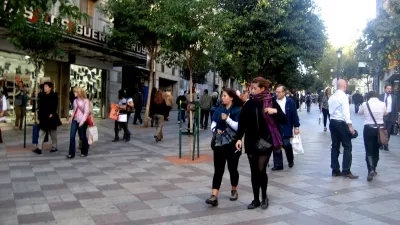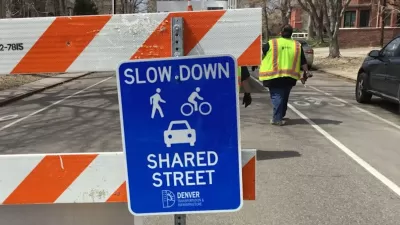Two blocks of the marquee street will become mostly car-free public spaces.

Two city blocks in Manhattan will become a “premier public space” open primarily to pedestrians and bikes, reports Kevin Duggan in Streetsblog NYC. According to Duggan, “Capital reconstruction would start in September 2026 and take two years to complete, and the spaces will host a two-way cycle lane, public seating, plantings and spaces for art.” The block between 39th and 40th Streets will be closed to cars, while the block between 38th and 39th will allow southbound vehicle traffic.
“The city painted a plaza on Broadway between 39th and 40th streets and created a shared street configuration on the block south of W. 39th Street three years ago, which officials plan to transform with concrete to be level with the curb, Department of Transportation reps told the Community Board 5 Transportation Committee on Monday.” The project is part of the larger Broadway Vision plan to improve the signature street.
FULL STORY: Sound Vision: Two Broadway Blocks To Get Permanent Upgrades

Manufactured Crisis: Losing the Nation’s Largest Source of Unsubsidized Affordable Housing
Manufactured housing communities have long been an affordable housing option for millions of people living in the U.S., but that affordability is disappearing rapidly. How did we get here?

Americans May Be Stuck — But Why?
Americans are moving a lot less than they once did, and that is a problem. While Yoni Applebaum, in his highly-publicized article Stuck, gets the reasons badly wrong, it's still important to ask: why are we moving so much less than before?

Using Old Oil and Gas Wells for Green Energy Storage
Penn State researchers have found that repurposing abandoned oil and gas wells for geothermal-assisted compressed-air energy storage can boost efficiency, reduce environmental risks, and support clean energy and job transitions.

Updating LA’s Tree Rules Could Bring More Shade to Underserved Neighborhoods
A new USC study finds that relaxing Los Angeles’ outdated tree planting guidelines could significantly expand urban tree canopy and reduce shade disparities in lower-income neighborhoods, though infrastructure investments are also needed.

California's Canal Solar Projects Aim to Conserve Resources and Expand Clean Energy
California’s Project Nexus has begun generating electricity from solar panels installed over irrigation canals, with researchers and state agencies exploring statewide expansion to conserve water and boost clean energy production.

HHS Staff Cuts Gut Energy Assistance Program
The full staff of a federal program that distributes heating and cooling assistance for low-income families was laid off, jeopardizing the program’s operations.
Urban Design for Planners 1: Software Tools
This six-course series explores essential urban design concepts using open source software and equips planners with the tools they need to participate fully in the urban design process.
Planning for Universal Design
Learn the tools for implementing Universal Design in planning regulations.
Heyer Gruel & Associates PA
City of Moreno Valley
Institute for Housing and Urban Development Studies (IHS)
City of Grandview
Harvard GSD Executive Education
Salt Lake City
NYU Wagner Graduate School of Public Service
City of Cambridge, Maryland





























